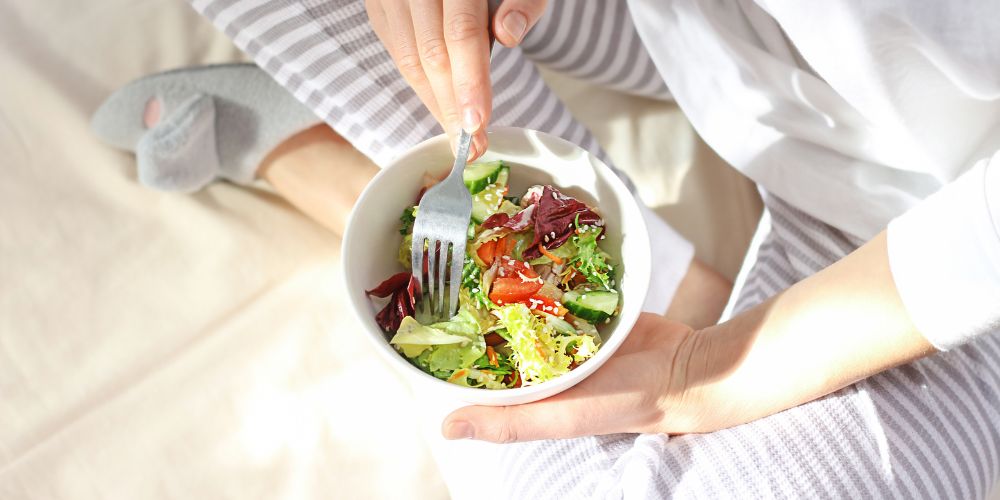Endometriosis – nutrition for the early stages

March is officially Endometriosis Awareness Month. Affecting roughly 10 per cent of women at reproductive age, the condition has also been linked with fertility struggles. But to understand endometriosis better, we must first learn what it actually is and how it manifests. From here, we can explore the best ways to manage symptoms, from endometriosis nutrition support to clinical protocol.
What is endometriosis?
Endometriosis occurs when tissue similar to the lining of the uterus grows outside the uterus. Most commonly, this excess tissue appears on the ovaries and/or the fallopian tubes. In some rare cases, tissue can spread even further to organs such as the bowels, liver and lungs.
Why does this happen? It is generally believed that the cause behind endometriosis is that when cell structures similar to your endometrial lining are shed during your period, as normal, they actually move the wrong way (this is known as retrograde menstruation). So, instead of leaving your body as a period, they travel through the fallopian tubes and into the pelvis. This is what can cause symptoms such as pain, as well as have an impact on fertility.
Signs and symptoms of endometriosis
- Pain during ovulation
- Absence of ovulation (anovulation)
- Pain during menstruation
- Pain during bowel movements
- Pain during urination
- Pain during exercise
- Pain during intercourse
Ringing any bells? If any of these symptoms resonate with you, it is definitely worth consulting your doctor to help investigate further. If you are looking to conceive, and have been diagnosed with endometriosis, Laurel Fertility Care can help you find the best course of action and continue treatment.
Stages of endometriosis
While endometriosis is one condition, it actually presents in several different stages. But remember, levels of pain and severity of symptoms does not always correlate with each stage. For instance, someone with mild and superficial endometriosis could experience more pain or physical symptoms than someone else with more severe, deep infiltrating endometriosis.
If you do pursue medical help, however, you are likely to be given a stage classification.
Let’s explore these further.
Stage 1 – Minimal – During “minimal” endometriosis, lesions, or implants, are small and superficial, meaning they’re close to the surface of the tissues. There may not be any scar tissue, or it is minimal.
Stage 2 – Mild – “mild” endometriosis means there are more lesions, and they tend to be located deeper inside the tissue. There might be scar tissue, but there isn’t usually inflammation present.
Stage 3 – Moderate – “moderate” endometriosis means there are some deep endometrial implants. There can be endometrial cysts in at least one of the ovaries which are commonly called endometriomas.
Stage 4 – Severe – “severe” endometriosis means there are many deep endometrial implants. Implants can be located on the fallopian tubes and bowels. Adhesions can be thick and dense, and they can cause severe pain. The distortion of the pelvic anatomy is typically what leads to fertility issues.
Managing endometriosis
Laurel Fertility Care is a boutique fertility clinic in California, USA. Watch back our chat with Medical Director, Dr Smikle who covers endometriosis symptoms / diagnosis, surgery, treatment options / timings and IVF success.
Whilst the later, more severe stages may warrant medical attention such as a laparoscopy, research has shown that diet and nutrition can have an impact upon symptoms.

Go for an anti-inflammatory diet
Fiber
When considering a diet to cater for endometriosis, think fiber, fiber, fiber! Estrogen is an important hormone that is necessary for everyday functioning. But too much estrogen can aggravate endometriosis symptoms. Cramping and general pain are not only horrible to endure, but can also have a huge effect upon your day to day life. This is where fiber comes in.
Your body gets rid of excess estrogen through the stool. We have all been told to eat a banana when struggling to go to the toilet, and the same rule applies here.
You can boost your bodily fiber by adding more of these foods into your diet:
- Fruits and vegetables, but eat the whole food and avoid juice
- Legumes such as beans, lentils and chickpeas
- Ground flaxseed
- Vegetables
- Whole grains such as brown rice
Minerals
Minerals are always an important part of good nutrition. For managing endometriosis symptoms, make sure you are getting enough magnesium and zinc. These can help relax muscles and tackle some of the more severe menstrual cramps.
These foods are rich in the right minerals:
- Dark chocolate (avoid too much as chocolate typically contains sugar which can be inflammatory for endometriosis)
- Leafy greens such as dark lettuce, kale and spinach
- Legumes, like black beans and edamame
- Nuts and seeds (especially almonds and pumpkin seeds)

Fats
As endometriosis is an inflammatory condition, excess inflammation can make symptoms even more severe. Omega-3 fats are able to calm inflammation caused by endometriosis. Some good food sources of omega-3s include:
- Fatty fish, such as salmon, sardines and tuna
- Nuts and seeds, like walnuts, chia seeds and flaxseed
- Plant oils, such as flaxseed oil and canola oil
Monounsaturated fats also have anti-inflammatory power. You can find them in:
- Avocados
- Nuts and seeds
- Olive oil
- Peanut butter
Foods to avoid
Just as there are foods to incorporate when tackling the early stages of endometriosis, there are also some foods to avoid. Some foods can either add excess inflammation or boost estrogen levels which is exactly what we want to avoid. These are the ones to look out for:
- Alcohol
- Caffeine
- Fatty meat
- Processed foods
- Sugary drinks
Trying to conceive with endometriosis
There are so many questions and approaches surrounding endometriosis, particularly when you are trying to conceive. For an expert, patient-focussed experience, head to Laurel Fertility Care to explore your options further.




